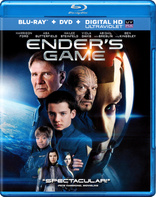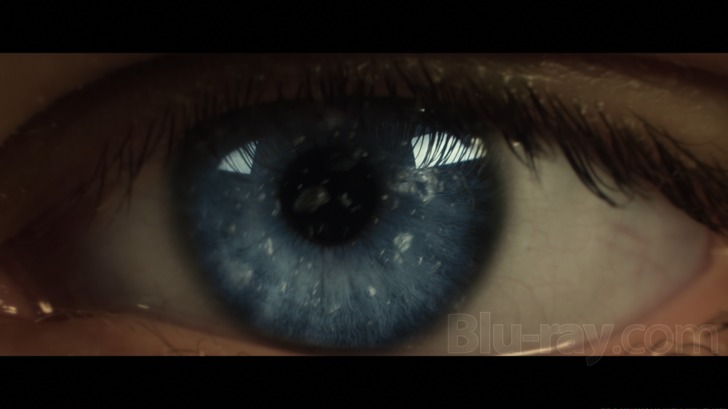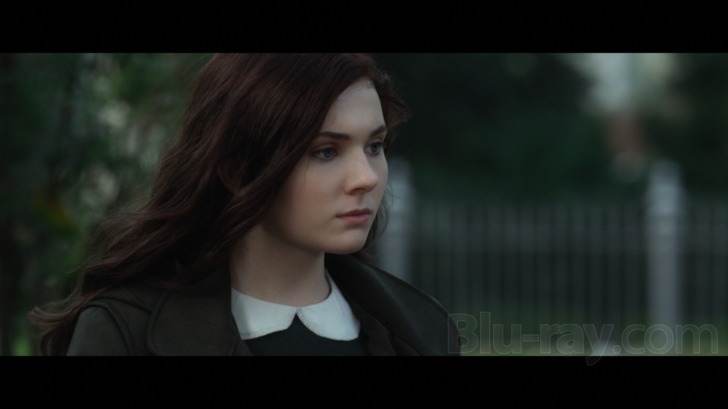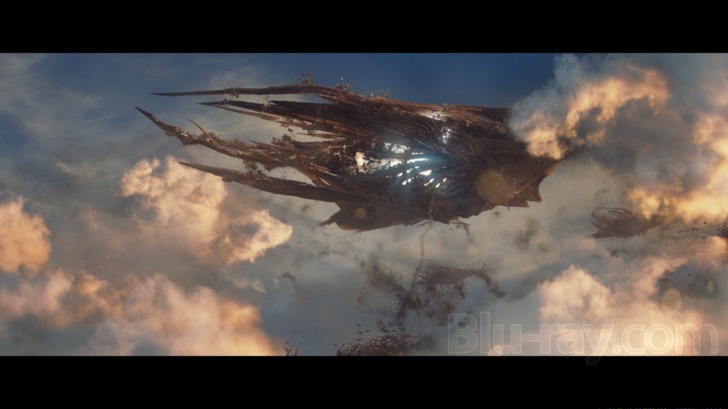Ender's Game Blu-ray Movie
HomeEnder's Game Blu-ray Movie 
Blu-ray + DVD + UV Digital CopySummit Entertainment | 2013 | 114 min | Rated PG-13 | Feb 11, 2014

Movie rating
6.8 | / 10 |
Blu-ray rating
| Users | 3.7 | |
| Reviewer | 4.0 | |
| Overall | 4.0 |
Overview
Ender's Game (2013)
70 years after a horrific alien war, an unusually gifted child is sent to an advanced military school in space to prepare for a future invasion.
Starring: Asa Butterfield, Harrison Ford, Hailee Steinfeld, Abigail Breslin, Ben KingsleyDirector: Gavin Hood
| Action | 100% |
| Adventure | 92% |
| Sci-Fi | 74% |
Specifications
Video
Video codec: MPEG-4 AVC
Video resolution: 1080p
Aspect ratio: 2.40:1
Original aspect ratio: 2.39:1
Audio
English: DTS-HD Master Audio 7.1 (48kHz, 24-bit)
Spanish: Dolby Digital 5.1 (640 kbps)
English: Dolby Digital 2.0 (224 kbps)
Subtitles
English, English SDH, Spanish
Discs
50GB Blu-ray Disc
Two-disc set (1 BD, 1 DVD)
UV digital copy
DVD copy
Packaging
Slipcover in original pressing
Playback
Region A (locked)
Review
Rating summary
| Movie | 3.5 | |
| Video | 4.5 | |
| Audio | 4.5 | |
| Extras | 3.0 | |
| Overall | 4.0 |
Ender's Game Blu-ray Movie Review
Haven't these people ever heard of Raid?
Reviewed by Jeffrey Kauffman January 25, 2014The legendary Arthur C. Clarke ( 2001: A Space Odyssey) famously posited an alien who looked like The Devil in his epochal novel Childhood’s End, certainly one of the more fanciful imaginings of what our first contact with visitors from outer space might entail. But more and more over the past few decades, it seems that science fiction has been overrun by nasty bad beasts from beyond the Milky Way who look like various insects. All sorts of properties from the Starship Troopers Trilogy to the Alien Anthology have grossed out viewers with various bug-like creatures that may have left even the most ecologically minded begging for the return of DDT. Add Ender’s Game to that seemingly ever increasing list. In fact in the book series by Orson Scott Card which gave birth to this film, the aliens are referred to pejoratively as Buggers, though the film utilizes Card’s later formulation, the supposedly more scientific sounding term Formic, which refers to the Latin word for ant, formica (which begs the question of what the developers of the laminate countertops were thinking). Ender’s Game had an unusually long gestational period between its first appearance and its film adaptation, at least part of which was due to novelist Card’s insistence that he have creative control over the adaptation. While Card does indeed have a producing credit on the film, the rest of the creative crew may have actually wanted to create a little distance between themselves and Card after some of Card’s long held beliefs about homosexuality and same sex marriage created a firestorm just as the film was about to hit theaters. Card’s contrarian worldview is part and parcel of Ender’s Game, though certainly not with regard to either of the “issues” mentioned above. Instead, Card in his novel addresses several really interesting and even provocative ideas, including the militarization of youth and the slow but stunning realization that sometimes an enemy may not indeed be as dangerous as originally thought. While both of these concepts make it into the film version of Ender’s Game, the film is surprisingly flat at times, never really fully exploiting some of Card’s almost deliberately challenging theses.

Earth barely survived its first encounter with the Formic, and it has spent the intervening fifty years making sure that any new encounter will result in the Formic’s destruction. Part of the planet’s strategy is to raise kids with nonstop access to videogames that feature battle scenarios (wait—isn’t this supposed to be the future?). Those with especially promising gaming skills are recruited to be part of a paramilitary organization where they are trained, again in a game simulation environment, to ultimately take on the Formic in what is anticipated is an imminent, unavoidable maelstrom. The kids are repeatedly shown film of hero Mazer Rackham saving Earth by flying his craft directly into the literal belly of the beast, a huge hovering mother ship whose destruction put an end to the Formic's initial invasion of the planet.
Fifty years after Rackham’s heroism, a young boy named Ender Wiggin (Asa Butterfield) has attracted the attention of two officers in the International Fleet, Colonel Hyrum Graff (Harrison Ford) and Major Gwen Anderson (Viola Anderson), who keep track of the boy via a monitor that has been implanted in Ender’s neck. They watch him easily defeat a much older kid in a violent videogame, and furthermore deal strategically with the kid’s none to pleased reaction after having lost. Ender is taken to an infirmary where the monitor is removed, which leads Ender to believe he has failed to make the cut at the military academy. Shortly thereafter, he’s accosted by the kid whom he beat in the videogame and several of the kid’s buddies, but he rather handily dispatches all of them in hand to hand combat. It turns out that Graff and Anderson don’t actually need the monitor to keep track of Ender (shades of the NSA), and they’re more excited than ever that this young man may in fact be the heir to Rackham for whom they’ve been searching.
Ender arrives home absolutely distraught over the removal of the monitor and the subsequent showdown with the older kids, and he confides in his sister Valentine (Abigail Breslin), a girl who herself had not made the cut in the same training academy Ender also attended. (The siblings’ overly violent eldest brother was also summarily dismissed from the academy.) However, things begin to look up when Graff shows up at Ender’s home and invites him to the next step up in the training regimen, Battle School. It’s at this location that the bulk of the rest of Ender’s Game takes place, as Ender is put through his paces as a kind of grunt (initially called “launchies”) learning the ropes of the military organization and also having to deal with a seemingly unending array of bullies who don’t like the fact that he seems to be getting prepared by Graff to assume leadership duties.
The film is almost ridiculously formulaic at various points, despite its unusual setting and themes. Ender is initially an outcast, but slowly wins the respect of his fellow “gamers”, a transition which is depicted in an almost funny scene (shot from overhead) where kids at other lunch tables come over to join Ender, who had been sitting alone at his. Is this a high school popularity contest or something? Ender of course bonds with a pretty young recruit named Petra (Hailee Steinfeld), but continues to run afoul of various nemeses, most notably a pugnacious superior aptly named Bonzo (Moisés Arias). And in fact there’s a rather odd dichotomy in the film where teamwork is both celebrated and simultaneously denigrated, since, as one of the adults tells the kids, their “comrades” are also their competitors. It’s distinctly at odds with the way most military units tend to breed groupthink, and something that keeps coming back (too many times, some might argue) to haunt Ender, who seems to repeatedly be the “class nerd”, so to speak, subject to being bullied by the more “popular kids”.
Ender’s Game has a couple of relatively decent developments, including one featuring Bonzo, that manage to give the film some forward momentum. But a late appearance by Sir Ben Kingsley in a kind of “special guest star” role (which won’t be spoiled here, despite its predictability) threatens to derail the film. And the seemingly near incestuous appearing relationship between Ender and Valentine is less emotionally affecting than it is downright disturbing. In fact the film is weirdly emotionless. This is probably nowhere better seen than in the closing moments of the film, in what amounts to more a less a cinematic coda. Ender’s ability to ferret out what his enemies are thinking has been a running subplot throughout the film, and a late denouement allows him to finally grasp something about the Formic that (of course) no one had previously caught on to. Ender’s heroic move at this point, something that would seem to be one of the most epochal moments in Card’s original formulation of the story, is here handled almost as an afterthought, and as such, there’s absolutely no real emotional connection to the act. There may be tears in Ender’s eyes as the film fades to black, but my hunch is there aren’t very many in any audience members’.
Ender's Game Blu-ray Movie, Video Quality 

Ender's Game is presented on Blu-ray courtesy of Summit Entertainment and Lionsgate Films with an AVC encoded 1080p transfer in 2.40:1. The film has a lot of CGI and green screen elements, and the good news here is that the image in these sequences is not artificially soft as it sometimes tends to be in such outings. Interestingly, director Gavin Hood and cinematographer Donald McAlpine choose to just slightly desaturate the earthbound scenes, especially in the early going, where the first shot at the family home of Ender almost looks like it's in black and white. This helps some of the interstellar material to pop more in relation. The first part of Ender's training in outer space features a lot of a kind of sickly yellow color in both the lighting and some of the costumes the kids wear, which gives an artificial looking tint to flesh tones (see screenshot 7). The bulk of the film features the ever popular dark blue and slate gray color spectrum, which actually works very well here (screenshot 4). The only major complaint I personally have with this presentation is how dark so much of it is. The zero gravity games take place in an almost black environment at times, which means wide shots become a mass of shadow with only small movements indicating where the people actually are. The final battle scenes take place in an entirely shrouded environment (which otherwise rather oddly resembles that "thrust" stage that's central to several scenes in Terry Gilliam's Brazil), where some of the characters almost disappear into the background. The good news in all of this is that black levels are exceptionally deep and solid looking. Contrast is also generally strong, though a couple of the sequences on the Formic outpost planet look a tad hazy, especially Ender's quarters. That planet is cast in a weird brown-amber palette which tends to deprive the image of what is otherwise solid fine detail.
Ender's Game Blu-ray Movie, Audio Quality 

Ender's Game features a very effective and aggressive lossless DTS-HD Master Audio 7.1 mix that, aside from one niggling complaint, offers an often spectacular array of sound effects regularly filling the surrounds. In both large scale battle scenes as well as some of the "mind games" Ender plays on his handheld tablet, there's excellent attention paid to discrete channelization of foley effects. Dialogue is also smartly positioned around the soundfield, something that's especially noticeable in sequences like the big melees in the zero gravity environment. But those very skirmishes bring up the one place where this mix is slightly problematic—the players all wear helmets, which quite noticeably muffle their voices. I repeatedly had a hard time clearly making out what various actors were saying during these sequences. Otherwise, this is a stellar sounding track with spot on fidelity and incredible dynamic range.
Ender's Game Blu-ray Movie, Special Features and Extras 

- Audio Commentary with Director Gavin Hood. Hood, who had a military background himself as a relative youth (a 17 year old in South Africa), brings a bit of that history to his commentary, which he describes as "stream of consciousness". Hood actually fills in some nice character info that might have made the film a bit better. He also discusses a lot of the CGI, green screen effects and other aspects of the physical production.
- Audio Commentary with Producers Gigi Pritzker and Roberto Orci. While this is quite conversational, Pritzker and Orci detail quite a bit here, including a lot of info on the production design and how the book left a lot to the imagination which the film of course could not do. They also address some of the changes they made to the book (including with the character of Anderson).
- Ender's Game: The Making of Ender's Game (1080p; 49:04) is a set of eight featurettes that explore various subjects, like adapting the book for the screen, casting and some of the convoluted wire work required for the zero gravity scenes.
- Deleted/Extended Scenes (1080p; 10:49) feature optional commentary by director Gavin Hood.
- Inside the Mind Games (1080p; 3:50) looks at some of the motion capture techniques utilizes to forge the games that Ender plays on his tablet.
- Theatrical Trailers include Trailer A (1080p; 1:55) and Trailer B (1080p; 1:57)
Ender's Game Blu-ray Movie, Overall Score and Recommendation 

Ender's Game is perfectly serviceable in virtually every area, but I personally kept wishing it simply had more emotional heft. This is a really strangely cold and dispassionate space opera, something that seems decidedly odd considering it deals with a very emotional hero. The film has stunning visuals and its themes are quite relevant to our contemporary world, but if you're looking for something to actually move you, this is probably not the right property. This Blu-ray has top notch technical merits and comes with some good supplements. Recommended.
Other editions
Ender's Game: Other Editions
Similar titles
Similar titles you might also like

Edge of Tomorrow 4K
Live. Die. Repeat.
2014

Battleship
2012

Pacific Rim 4K
2013

Independence Day: Resurgence 4K
2016

Star Wars: Episode I - The Phantom Menace 4K
1999

After Earth
2013

Star Trek Into Darkness
2013

Transformers: Age of Extinction 3D
2014

Star Trek 4K
2009

Star Trek Beyond
Bonus Disc / Exclusive Packaging / Character Cards
2016

Man of Steel
2013

G.I. Joe: The Rise of Cobra
2009

Starship Troopers: Invasion
2012

Divergent 4K
2014

Bumblebee 4K
2018

Battlestar Galactica: Season Three
2006-2007

Star Wars: Episode II - Attack of the Clones 4K
2002

Star Trek IV: The Voyage Home 4K
1986

Star Trek II: The Wrath of Khan 4K
1982

Independence Day 4K
20th Anniversary Edition
1996



